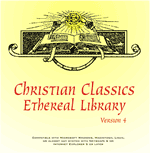Most of the discussion that we'll be focusing on as time goes on, will be based on difficult passages of Scripture. As this is the case, it will be important that we're all working off the same page, so to speak.
Before we can begin to discuss arguments from the texts of Scripture, we must first understand what Scripture is, and what Scripture is not. We must come to a definition of terms, before delving into what Scripture says. If we were to neglect this starting point, it would not be long before misunderstandings surfaced due solely to an inadequate beginning. And so we examine first, this Book I hold in my hand. What is it? Where does it come from? What is its history, and what makes it unique?
I harbor no illusions that I'll completely answer all these questions for you, but I can and will answer them in the manner that satisfied me as I sought out the answers for myself. I will share with you what I have found, in hopes that you will see what I see. If not, well... I can do no more. Nevertheless, it is here we must begin.
"For the word of God is living and active and sharper than any two-edged sword, and piercing as far as the division of soul and spirit, of both joints and marrow, and able to judge the thoughts and intentions of the heart." (Hebrews 4:12)
"All Scripture is inspired by God and profitable for teaching, for reproof, for correction, for training in righteousness; so that the man of God may be adequate, equipped for every good work." (2 Timothy 3:16-17)
It is from the above two New Testament passages primarily, and from many others as well, that we derive our stance on the Bible. The observation that is continually surfacing from those who challenge the authenticity, infallibility and/or the inerrancy of the Bible, seems to be "That's absurd! How can it possibly be inerrant, when there are so many different versions and nobody uses the same one?!" Or the reaction is an immediate judgment of the sort that goes, "It's just a book written by man (and many different men, at that), so of course it's not infallible."
An honest observation, and I will give an honest reply. The plain and simple answer is that when we discuss the concept of Scripture being inerrant, we're not talking about any of the English versions or translations of the Bible, whether it be the King James Version, or even the Latin texts that were used for centuries. We're not even talking about the copies of the Greek and Hebrew texts that were passed around by the early Church, which we have compilations of available to us today.
What we're talking about, when we say that Scripture is inerrant, are the originally penned writings of the original authors of the original books. In other words, as Paul put ink to paper (or as the case probably was, as he dictated them to a scribe), we believe that the Holy Spirit was working with and through Paul (and the other writers), in a way that we do not, and cannot, fully understand, in order to bring to the Church the authoritative Word of God.
Each writer obviously maintained their own perspective and flavor of writing, which is evident from the texts, but overall, there is an incomparable cohesiveness to the whole of Scripture, due to the fact that there is One overall Overseer throughout the history of the writing process.
So if we're talking about the original texts, then you may ask "What good are these translations and other versions then?" Another good question, to be sure. We do not have any of the originally penned texts of Scripture at all. But what we do have, are thousands of scraps and bits of very early copies of texts, and a few very early complete manuscripts containing the whole Bible (or at least most of it). And so what we have is a history full of attempts at compiling those copies of the Greek and Hebrew texts (the original languages that the Bible was written in), and then translating them into common language, in order that they be useful for the common man.
Unfortunately, that history is also full of attempts by corrupt individuals and mislead groups of people, who desired to use Scripture as a tool for power. "He who controls the Holy Book, controls the masses," seems to be the overarching theme throughout history.
On the upside, that same history is also dotted with bright spots, where various individuals (such as John Wycliff, John Hus, William Tyndale, and Martin Luther, to name a few) struggled and sacrificed to ensure that the common man had open access to the Word of God, as it was originally intended. You may read more about the history of the Bible Translation here.
In summary, what we need to realize, is that reading and studying the Bible is just as much an academic activity as it is a spiritual one. Due diligence in research and thought is needed in order to "rightly divide" Scripture, to use a biblical term. If one approaches the Bible with a purely academic approach, it's very likely you will not glean from it as much as you could. Likewise, if one approaches Scripture with the attitude that research, intellectual study, and the academic pursuits have no place with the Bible, then we are seriously limiting our ability to understand what the intended communication is to be. There must be a balance and a use of both the spiritual and the intellectual. One without the other is the recipe for terrible doctrines that work counter to the intent of the message of Scripture.
Monday, March 5, 2007
Subscribe to:
Post Comments (Atom)






No comments:
Post a Comment